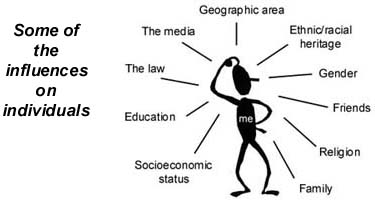
Adolescence: Growing into maturity stage
Adolescence is the ‘growing into maturity stage.’ This little definition rings a bell and a storm begins to well up on both the sides. Ask parents and they react, ‘Hey! Maturity is nowhere around. My
teenager is
NOW more confused.’ A teenager feels the same, ‘Well! My parents are so confused. They still treat me like a kid.’
The power of NOW is always stupendous yet ignored for the worrisome future blinds us and the memories of the past haunt us, ‘What is wrong with my child? He was so responsible. What will happen to his future?’ As co-author of How to Understand and Help Adolescents- a friendlier approach that was published around 20 years ago, I think the challenges persist and nothing much seems to have changed.
Let us look into the universal challenges during adolescence.
- Physical And Behavioral Changes: Nature plays havoc. Teenagers experience hormonal changes. They are growing in mind, body and spirit. They also sleep more, eat more, challenge often, argue, question, pick up fights, exert themselves and intrigued as they are they want answers about the birds and the bees.
- General Reason: They are growing to find their individuality amidst the confusion. They yearn for answers and acceptance.
- Solution: Patience is the key. Identify the need for sexuality education. Discuss freely or seek the help of a counselor. The naturalness of changes and answers make them feel confident about their own self.

Communication is the key to understand behavioural changes
- Peer Influence: Teenagers spend less time at home with parents and find their friends and acquaintances more engrossing. Parents react for academics suffer and result in fights for good sense falls on deaf ears.
- General Reason: Generation gap is being felt and peers provide solace and like-mindedness.
- Solution: Allow them freedom of interaction with peers but not without meeting certain academic goals.

Friends are forever
- Change In Appearance: Experiment is the basis of a teenage way of life. They want to try a new lifestyle, put on cool clothes, perhaps wear wigs, colour their hair or chop them for all they care. Your little one looks different, feels different but you wish him or her to remain the same.
- General Reason: Teenagers want to fit in for acceptance in their peer world.
- Solution: Do not nag for trivial stuff like a change in hairstyle, makeup or hippy dress. This will help you to say ‘NO’ for a night out without much of friction.

Creating a style statement
- Search For Identity: Young adults are worst hit by confusion at this. Habits develop, skills are learned and social conscience is formed. They may shock you with, ‘Why can’t I make a living by just living?
- General Reason: Adolescence is the period when learning shapes your child into a distinctive individual. In the process they may blurt out but not for long. Eventually, teenagers stabilise.
- Solution: Healthy discussions will help them ponder and help them shape up into thinking individuals.

Who am I?
- Opposing Ideology: Inconsistent behaviour and opposing ideologies become a norm. Teenagers are generally artistic, generous, and idealistic but they also exhibit egoistic, selfish, calculating nature.
- General Reason: They are exploring self and the outside world simultaneously; learning this way and that way.
- Solution: Listen for they want to share but do not evaluate and judge for you may hurt them beyond repair.

Factors influencing teenage ideologies
'Adolescence is a stage of life transition from late childhood to young adulthood and is characterised as stress-storm phase. The physique and physiological changes in the period of adolescence makes them pre-ooccupied with bodily concerns and promotes vulnerability to psychological thoughts. The constant search for identity gives rise to establishment of their own personal unique self and results in heightened emotional reactions like fists of rage, argumentativeness, sulking, flying off the handle and putting down others. There is tension and turmoil due to communication gap between them and parents. A little understanding, love, acceptance and unconditional positive regard can bring about healthy development and promote better quality of life among adolescents.'
Dr. Malar Suresh is a practicing Counselling Psychologist at St. Stephens College, Delhi. Her Phd is in psychology and she is specialised in handling problems related to young adults and rehabilitation of the same.'






 Adolescence: Growing into maturity stage
Adolescence is the ‘growing into maturity stage.’ This little definition rings a bell and a storm begins to well up on both the sides. Ask parents and they react, ‘Hey! Maturity is nowhere around. My teenager is NOW more confused.’ A teenager feels the same, ‘Well! My parents are so confused. They still treat me like a kid.’
Adolescence: Growing into maturity stage
Adolescence is the ‘growing into maturity stage.’ This little definition rings a bell and a storm begins to well up on both the sides. Ask parents and they react, ‘Hey! Maturity is nowhere around. My teenager is NOW more confused.’ A teenager feels the same, ‘Well! My parents are so confused. They still treat me like a kid.’
 Communication is the key to understand behavioural changes
Communication is the key to understand behavioural changes
 Friends are forever
Friends are forever
 Creating a style statement
Creating a style statement
 Who am I?
Who am I?
 Factors influencing teenage ideologies
'Adolescence is a stage of life transition from late childhood to young adulthood and is characterised as stress-storm phase. The physique and physiological changes in the period of adolescence makes them pre-ooccupied with bodily concerns and promotes vulnerability to psychological thoughts. The constant search for identity gives rise to establishment of their own personal unique self and results in heightened emotional reactions like fists of rage, argumentativeness, sulking, flying off the handle and putting down others. There is tension and turmoil due to communication gap between them and parents. A little understanding, love, acceptance and unconditional positive regard can bring about healthy development and promote better quality of life among adolescents.'
Factors influencing teenage ideologies
'Adolescence is a stage of life transition from late childhood to young adulthood and is characterised as stress-storm phase. The physique and physiological changes in the period of adolescence makes them pre-ooccupied with bodily concerns and promotes vulnerability to psychological thoughts. The constant search for identity gives rise to establishment of their own personal unique self and results in heightened emotional reactions like fists of rage, argumentativeness, sulking, flying off the handle and putting down others. There is tension and turmoil due to communication gap between them and parents. A little understanding, love, acceptance and unconditional positive regard can bring about healthy development and promote better quality of life among adolescents.'